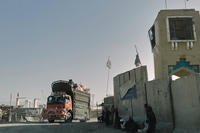The U.S. should be investing in more personnel, aircraft and ships to help the Coast Guard stop drugs trafficked on the high seas instead of spending billions on a wall along the southwest border, a top lawmaker said Tuesday.
The Coast Guard stops more drugs headed to the U.S. than all other federal agencies combined, said Rep. Peter DeFazio, chairman of the House Committee on Transportation and Infrastructure. That's why more funding for new medium-endurance cutters and other Coast Guard equipment is long overdue, he added.
"An investment in assets for the Coast Guard -- both personnel and equipment -- would be a heck of a lot better than a static wall that people can go around, under or through," DeFazio, an Oregon Democrat whose district includes several Coast Guard facilities, said during a hearing on maritime drug interdiction.
Related content:
- Coast Guard Budget Proposal 'Dead on Arrival' in Congress, Lawmaker Says
- Jumping Fish Lead Fishermen to $1 Million of Cocaine, Coast Guard Says
- Coast Guard Crew Unloads 7.1 Tons of Cocaine in San Diego
Drug traffickers are savvy and adjust their methods to avoid detection, Rear Adm. Steven Poulin, U.S. Southern Command's director of operations, told the committee. The Coast Guard is seeing more smugglers use submersibles to send drugs to the border underwater, he said, and the service doesn't have the assets it needs to stop them all.
That's left the Coast Guard intercepting just 20% of known shipments, DeFazio said.
"For too long, the Coast Guard has been making due," he said. "It's time that we move ahead with the acquisition of new assets."
President Donald Trump has long touted the effectiveness a wall along the U.S.-Mexico border as a way to keep people and illicit materials -- including drugs -- from entering the country. Since most of the drugs come into the U.S. through legal points of entry, DeFazio said, a wall isn't the best investment.
"According to testimony in 'El Chapo' [Joaquín] Guzmán's trial in New York," DeFazio said in reference to the court case involving the longtime Mexican drug lord, "the preferred method is to come through legal points of entry in converted semis, pickup trucks and other things.
"... We need to enhance our maritime interception, and the Coast Guard is the first line of defense there. And they need better assets," the congressman added.
Between 2016 and 2017, the Coast Guard intercepted close to a million pounds of cocaine, mostly in the eastern Pacific where traffickers move drugs from Central and South America. Synthetic opioids, which have fueled a crisis resulting in an uptick in drug overdose deaths in recent years, are largely coming into the U.S. in powder form, often through postal and other parcel facilities, said Thomas Padden, the interdiction coordinator at the Office of National Drug Control Policy.
Drug smugglers frequently lace cocaine with fentanyl, a synthetic opioid, Poulin said. And that's what the Coast Guard could be more successful in stopping with more resources, he said, including more intelligence, surveillance and reconnaissance aircraft to patrol remote spots.
The maritime "playing field" smugglers are using continues to expand, Poulin added, which is why DeFazio says the U.S. should be spending money on the Coast Guard in place of a wall.
"[That area] is a heck of a lot bigger than the border," DeFazio said.
-- Gina Harkins can be reached at gina.harkins@military.com. Follow her on Twitter @ginaaharkins.













